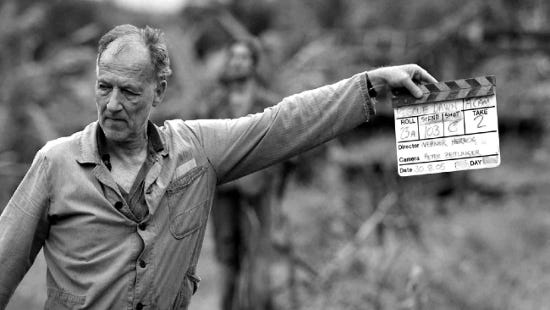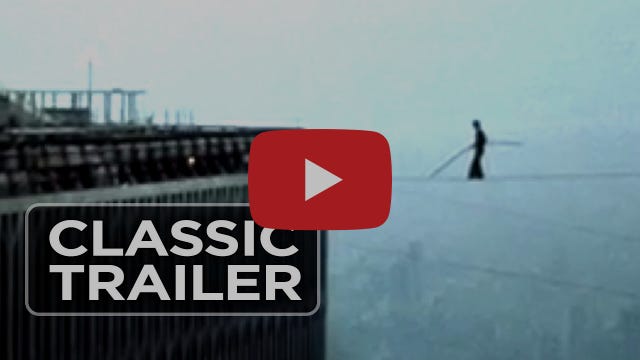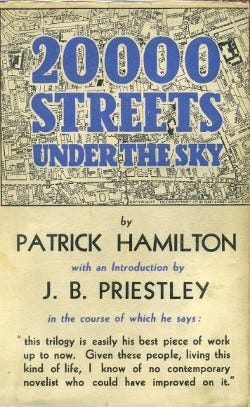New Escapologist : April 2021
On Roofs and Heads
Hello everyone. "Happy Monday" as they say in some offices, and welcome to the latest edition of our newsletter for devoted scarperers.
"How should we live?" is the core question of Escapology. We look to history and nature and our imaginations to ask what lies beyond our corporate and commercial shackles. For me this month, the question has moved over slightly to "Where shall we live?" as my partner and I consider buying a home for the first time.
This was the lifestyle adjustment to which I alluded in last month's newsletter. I'd imagined our experiences would lead to some interesting New Escapologist articles concerning the "rent versus ownership" debate on which I have long failed to come down firmly on a side.
After some apartment-shopping, however, I'm sure such articles would turn out to be deathly dull. The whole thing has turned out to be another annoyance: so many "home reports" and socially-distanced viewings and the constant miserly balancing of material and locational trade-offs. Urgh! It's about as rat-racey as things get.
Two or three months ago, we'd never thought of becoming home owners. We're natural renters, preferring to be light on our feet, ever-mobile, eternally on the moonlight flit. Keeps you sharp, that lifestyle, and I have liked it.
But curiosity got the best of me when a flat came up for sale directly across the street from ours and I called the estate agent to ask about it. It really was a half-hearted phone call from my writing table, a way to avoid doing any work for a few minutes.
It turned out the agent was also a mortgage adviser (of course!) and before I knew it (despite our very tiny shared income and my "job" as a largely-unknown writer) I was being told that we could have a mortgage if we wanted one and that our monthly repayments would be minuscule compared to our monthly rent.
This seems to be the financial argument of home owning: instead of paying almost a thousand quid a month (between us) in rent, we could pay closer to a hundred apiece and eventually get some of it back when we sell up and move on again. Everyone knows this, of course, but I never thought we'd qualify and, frankly, it had just never appealed. I wonder what has changed? I have some thoughts, actually, but I will save those for another day (or not).
Home ownership feels decidedly un-Escapological to me. Isn't an owned home another possession? Another pesky distraction from the good life? Yes and yes. This is why I am not quite comfortable with any of this yet. On the other hand, it promises on paper to offer an escape velocity that is hard to argue with. If it will reduce our monthly (and lifelong) overheads so fantastically, who are we to argue? We can invest the difference in all manner of creative or world-seeing or green-minded escapade. Or, of course, just keep it in the bank as runway so we can work even less. And (though this could be a wholly inventive flight of fancy on my part) we could live somewhere without a hole in the ceiling.
Anyway, it hasn't happened yet. Even so, I thought I would let you in on some light and rather boring house-shopping thoughts. Let me know if you have anything to add, my fellow Escapologists.
Yours with bricks and a side of mortar,
Robert Wringham
www.newescapologist.co.uk
Lock-picking is "Definitely a Good Skill" says Herzog
[Lock picking is] definitely a good skill, requiring sensitivity and patience, as Philippe Petit [demonstrated to my students;] he showed how to pick a pin tumbler lock and escape from hand-cuffs.
I recently munched my way through A Guide for the Perplexed by renegade filmmaker Werner Herzog.
It’s an offputtingly humongous book, but it’s really a big slice of delicious cake. It’s essentially an autobiography, spoken aloud by Herzog in response to questions put to him by a loyal biographer.
The book is useful for Escapologists in that Herzog shows how you have the chance (even a responsibility) to GET ON WITH IT, whatever IT might be to you.
He says, rightly, that we should ignore the nay-sayers, the ditherers, the pen-pushers and those who advise too much caution. You have one life. One life to enjoy the world and to make a contribution. Don’t let the pin-heads and the knuckle-draggers stand in your way!
The book, as its title might suggest, serves as an unorthodox self-help book. You really do go away from it feeling better, wired, armored and ready to take on the world again.
With regards to the lock picking, Herzog really does practice it. For him, it’s not a metaphor like here at New Escapologist. He sees it as a vital skill for creative people and he teaches it in his “Rogue’s Film School.”
He describes how he has picked the locks of gates and doors to let him into shooting locations rather than wasting his filming time seeking out some power-tripping facilities manager with a key. He says:
When the system doesn’t respond, when it doesn’t accept what you’re doing–and most of the time it won’t–you have to become self-reliant and create your own system. There will always be periods of solitude and loneliness, but you must have the courage to follow your own path. Cleverness on the terrain is the most important trait as a filmmaker.
Moreover, at his aforementioned Rogue’s Film School (where he doesn’t teach any actual filmmaking, choosing instead to hone character and fortitude in his students rather than dwell on technicalities) he gets his students to “read, read, read. Those who read own the world; those who immerse themselves in the Internet or watch too much television will lose it.”
If I taught a School for Escapologists, I would say precisely the same thing. And if I offered a reading list to my students, I fancy Herr Herzog’s monster tome would be on it. It’s a truly exciting guide to living on your wits.
A true hero of creativity and Escapology if ever there was one. He will barely even acknowledge The Trap. He just gets on with what he wants to do.
Tired of the everyday grind?
👉 Try my book, The Good Life for Wage Slaves. 👈
Man on Wire
Philippe Petit (mentioned by Herzog in the section above) is the peculiar and very brave man who once walked a tightrope between the twin towers of the World Trade Centre in New York.
The documentary about this crazy caper, Man on Wire (2008), is breathtaking. The real fun was perhaps not in the walk itself but in his painstaking preparation and his hoodwinking of so many people to actually get away with it.
I wrote about this some hundred years ago in New Escapologist Issue Four:
In 1974, French high-wire artist Philippe Petit walked a wire between the towers of the World Trade Centre. The wire walk was entirely unsanctioned. To complete the feat, Philippe and Co had to secure confederates in both towers, to navigate WTC security systems, and to find a way of setting up the wire without being detected. The operation was executed with the poise, preparation and secrecy of a heist.
The documentary, Man on Wire, contains a scene (a recreation) in which Petit must hide beneath a tarpaulin for what must have seemed like hours while a security guard ate his lunch only feet away. The thrill of the operation was not the high-wire walk itself but the exhilarating sense of pulling the wool over authority’s eyes and doing something unsanctioned.
It’s the thrill of graffiti, of crop circles, of hacking, of illegal raves. There is a brilliant piece of archive footage of an NYPD officer looking up at Petit’s wire in disbelief: mission accomplished.
This is the programme on which Herzog seems to run. Astonish them if you must. Ask forgiveness, not permission. Get on with it.
To read more about “getting on with it,” try my book I’m Out (strictly-limited special price via this link only).
This is the same book, incidentally, as Escape Everything! but re-titled for paperback.
Refuse Your Own Success
Reader Leon shares additional wisdom from Philippe Petit at the New Escapologist blog. He says:
"A line from the film – 'refuse your own success' – has always stuck with me. As an accidental overachiever in the traditional sense, I’ve had to refuse [what many people would call] success in order to achieve the real thing. You have to escape from someone else’s utopia and find your own."
The quote from Petit goes:
"Life should be lived on the edge. You have to exercise rebellion: to refuse to tape yourself to rules, to refuse your own success, to refuse to repeat yourself, to see every day, every year, every idea as a true challenge – and then you are going to live your life on a tightrope."
Afflictions Common to Wage Slaves
20,000 Streets Under the Sky by Patrick Hamilton is a missing link between the social comedies of H. G. Wells (these being Kipps and The History of Mr Polly) and Orwell’s stories of creatively-inclined working stiffs (like Keep the Aspidistra Flying and Coming up for Air). I really enjoyed it. If you’ve not read Patrick Hamilton before, I’d recommend his Hangover Square first but 20,000 Streets is smashing too.
It’s a “plight of the working class” kind of book, stylishly told and with a dash of dark humour. It’s actually a trilogy of novels in which the three central characters’ strands interact and intertwine.
Each character has eyed the potential for escape (a sum of money, the support of stronger people) and each escape is gradually undermined or foiled. It’s humorous but very much on the side of the working class; the pathos of what Hamilton once or twice refers to as “social destiny.”
Towards the end, there’s a moment in which Hamilton talks about “wage-slaves” (the hyphen is his) in a more analytical tone than elsewhere in the book. The analysis has been present all the way through, but by the end he really goes for it and speaks more directly to us through the page.
One of our three characters, a barmaid called Ella, reports to a posh house in Chiswick after hearing there might be a job for her as a nanny. It’s still a job but it’s well paid and she’s always wanted to work with children; it would also take her to India, which she finds exciting. She sees the prospect as an escape. First though, she must get to the interview:
It is in nearly all cases impossible for servants, or wage-slaves of any kind, to seek happier conditions free of charge, and the heavy tax of eightpence (fourpence there and back) was exacted by the Underground railway on her way to N. W. 3.
I’ve had similar experiences of fury. When you don’t have a lot of money, it really stings to invest some of it in simply having a chance at finding work. Which, of course, you don’t really want anyway.
When she finds the house of her prospective employers, she is almost too frightened to go in:
She found Number Five but was now in such a state of fright that she had to walk on a little way to collect herself–an affliction of the nerves common to wage-slaves, with only their labour power to sell, and the consciousness and their insignificance and powerlessness before their aloof and comfortable masters.
And when she rings the bell, a maid comes to the door. A house maid, one might imagine, would share a sense of solidarity with a barmaid but instead she is suspicious of Ella’s presence on the doorstep:
Hidden rivalry and circumspection, rather than fellow-feeling, most often exists between wage-slaves such as these, possibly because their sensitiveness to the dangerous surplus of willing wage-slaves on the market, and possibly because certain fortunate wage-slaves come to acquire some of the aloof and clannish airs of their lords above.
The interview doesn’t go very well. In fact, the lady of the house is more interested in the antics of her disobedient dog (“Bustah! Bustah! Get down, Bustah!”) than taking the opportunity that had been dangled before Ella in any way seriously.
It is a book of great insight, I think, into the life of wage slaves. To the library! You know, when they reopen. Which, for most of us, is actually very soon!
(Incidentally, I borrowed this book from a local library, which is currently under threat from closure along with one other; if you'd like to sign a petition against these closures, please scroll to the bottom of this email and read the post-scriptum).
Stay at Home Forever?
In this Twitter thread, Vice writer and section editor Simon Doherty asks his followers, "would you prefer to go back to the office or stay at home forever?"
Answers include: "I'm never going back to the office full-time. I will do 2-3 days per week [...] but if an employer insists on 5 days per week in the office I'll go elsewhere"
and:
"home forever, preferably with a swimming pool."
Can't argue with that, though it makes me wonder if the poster considers working from home to be as fantastical as swimming pool ownership.
There are some differing viewpoints too, including one about the economy that is so stupid as to essentially argue for the abolition of office life anyway.
Advanced Pedantry
I'll leave you with this head-scratcher from Flann O’Brien’s The Best of Myles (1968):
ESCAPEE GETS JAIL FOR LIFE. One sighs, of course–I mean, surely this man was (if anything) an escaper. The escapee was the governor of the jail.
Amazing.
Remember to let me know your thoughts (if you have any) on the Escapological costs and benefits of owning a cuboid of strategically-placed bricks.
Peace and long life, 🖖
Robert Wringham
www.newescapologist.co.uk
PS: I've been campaigning in a low-key way to help save two century-old public libraries threatened with closure by small-minded dimwits. If you want to help in a tiny way you could do worse than sign these two petitions: one and two. Thanks.









